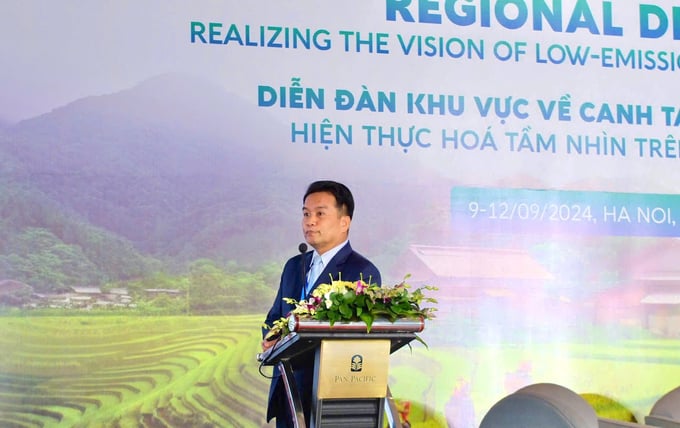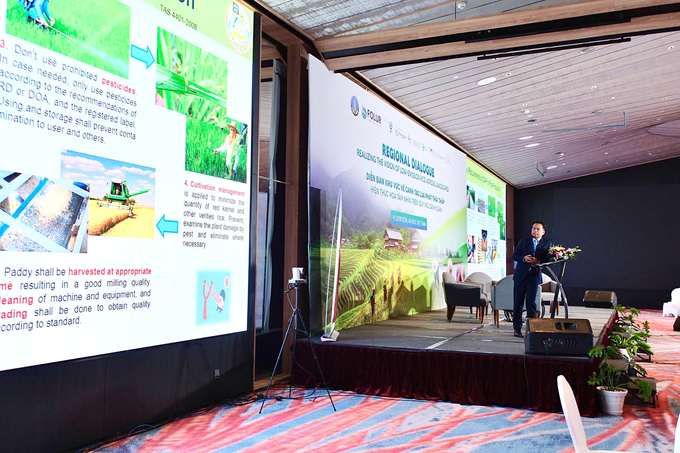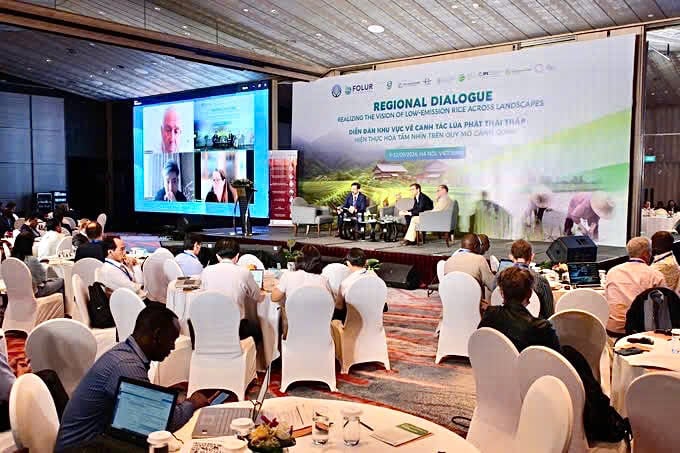May 23, 2025 | 16:09 GMT +7
May 23, 2025 | 16:09 GMT +7
Hotline: 0913.378.918
May 23, 2025 | 16:09 GMT +7
Hotline: 0913.378.918

The Deputy Director of the Rice Department of Thailand (Ministry of Agriculture and Cooperatives of Thailand) shared their experience on rice traceability at the regional forum "Low-Emission Rice Cultivation". Photo: Quynh Chi.
On the afternoon of September 10, the Deputy Director of the Rice Department of Thailand (Ministry of Agriculture and Cooperatives of Thailand) shared their experience on rice traceability at the regional forum "Low-Emission Rice Cultivation".
In Thailand, rice cultivation occupies a significant portion of the country’s total arable land. Therefore, since 1957, the Thai government has established a set of standards for rice to ensure quality and food safety, while also enhancing the reputation and competitiveness of Thai rice in the international market. These standards further support farmers through training and encouraging sustainable cultivation practices.
According to Mr. Chitnucha Buddhaboon, Deputy Director of the Rice Department of Thailand, in 1957, Thailand established the first national rice standard to standardize rice quality to protect consumers and enhance export value. This was one of the initial steps in setting up an official standard system for the rice production industry in Thailand. Over the years, Thailand has continuously updated and improved these standards to meet the increasingly high demands of both domestic and international markets, producing high-quality rice products while integrating sustainability and environmental friendliness.
Mr. Chitnucha Buddhaboon emphasized that it is crucial to apply standards from the sowing stage through to the final product. Thai farmers are actively adopting technological methods and adhering to Good Agricultural Practices (GAP) for rice production.

Mr. Chitnucha Buddhaboon emphasized that it is crucial to apply standards from the sowing stage through to the final product. Photo: Quynh Chi.
Currently, only 20% of the rice cultivation area is equipped with irrigation systems. Specifically, according to 2023 data, Thailand's rice cultivation covers approximately 10 million hectares, of which 2 million hectares are irrigated rice fields and the remaining 8 million hectares are rain-fed rice fields.
Therefore, effective land and water management, appropriate rice variety selection, and accurate cultivation techniques are essential. Additionally, controlling pests and weeds through appropriate measures and using fertilizers and pesticides correctly to avoid contamination is crucial. Thailand has banned and restricted the use of certain harmful pesticides and instead encourages farmers to use organic or natural alternatives. After harvest, rice is carefully processed to ensure quality. Labor safety and health for workers are also ensured.
According to the experience of organic rice production in Thailand, Mr. Chitnucha Buddhaboon, Deputy Director of the Rice Department of Thailand, stated that the land must be left fallow for at least 1 to 3 years before planting organic rice. This period allows for the complete removal of chemical pesticide and fertilizer residues. During this time, the soil should be rehabilitated using natural methods such as organic fertilization and green manure, while preventing contamination from external sources.
In addition, the government will play a regulatory role. The Thai Agricultural Standards Board (TASB), established under the Ministry of Agriculture and Cooperatives of Thailand, is responsible for setting and evaluating quality standards for agricultural products.
In Thailand, rice inspection activities have been transferred to private sector inspectors to enhance efficiency and accuracy in ensuring quality and food safety. This transfer allows the Ministry of Agriculture and Cooperatives to focus on developing and updating policies, standards and regulations, while private entities handle the actual implementation and monitoring of quality.

Mr. Chitnucha Buddhaboon highlighted the importance of data and traceability systems. Photo: Quynh Chi.
Speaking at the forum, Mr. Chitnucha Buddhaboon highlighted the importance of data and traceability systems. From the initial planting to the final product, it is crucial to ensure that data and records are accurate and comprehensive. In particular, farmers need to be equipped with the necessary knowledge and understanding to appreciate the importance of data record-keeping.
Therefore, the Rice Department of Thailand has developed the ThaiRice Trace application. This app allows users to trace the origin of rice products, providing detailed information about production facilities, cultivation regions and farming practices. In addition to verifying quality and food safety certifications, ThaiRice Trace monitors the production process from planting to harvesting, processing, and packaging. Users can also submit feedback or complaints about product quality if issues are detected, as well as access information on pricing and market trends.
By using ThaiRice Trace, the Thai rice industry not only ensures product quality but also supports all stakeholders, from farmers to consumers, in maintaining transparency and reliability.

(VAN) Alt Carbon has raised $12 million in a seed round as it plans to scale its carbon dioxide removal work in the South Asian nation.

(VAN) Attempts to bring down the price of the Japanese staple have had little effect amid a cost-of-living crisis.

(VAN) Fourth most important food crop in peril as Latin America and Caribbean suffer from slow-onset climate disaster.

(VAN) Shifting market dynamics and the noise around new legislation has propelled Trouw Nutrition’s research around early life nutrition in poultry. Today, it continues to be a key area of research.

(VAN) India is concerned about its food security and the livelihoods of its farmers if more US food imports are allowed.

(VAN) FAO's Director-General emphasises the need to work together to transform agrifood systems.

(VAN) Europe is facing its worst outbreak of foot-and-mouth since the start of the century.